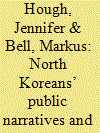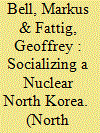| Srl | Item |
| 1 |
ID:
146647


|
|
|
|
|
| Summary/Abstract |
Through the selective allocation of attention, framing and metaphors in covering foreign affairs and countries, media narratives often act to delegitimise, marginalise and demonise international actors. Focusing on Australian reportage of North Korea in The Australian, The Sydney Morning Herald and from the Australian Broadcasting Corporation (ABC) between 1 January 2010 and 31 December 2012, this paper explicates how the framing mechanisms utilised in media point to media complicity in reinforcing a negative, adversarial orientation towards North Korea. It also discusses implications for how Australians view the North Korean people, Australian–North Korean relations, and policy pertaining to Northeast Asia more broadly.
|
|
|
|
|
|
|
|
|
|
|
|
|
|
|
|
| 2 |
ID:
171953


|
|
|
|
|
| Summary/Abstract |
This article draws on the public testimonies of North Koreans living in South Korea (t’albungmin) and analyzes the role that these narratives play in South Korean society as mechanisms of inclusion and exclusion. North and South Korea technically remain at war, with South Korea claiming sovereignty over the entire Korean peninsula. While t’albungmin are eligible for South Korean citizenship, they describe feeling excluded from full social membership. Although some t’albungmin seek anonymity, this paper considers those who gain social status by speaking publicly about their lives and denouncing the North Korean regime. In so doing, they distance themselves from North Korea and align themselves with the “good” discourse of human rights. However, their actions reinforce a logic of exclusion, implying that t’albungmin who prefer anonymity are “sympathizers” of the North and consequently restricting their access to social benefits and resources. This case of conditional inclusion illuminates tensions that arise when a sovereignty claim entails the incorporation of people from an enemy state. It also highlights the carefully delineated boundaries of publicly acceptable behavior within which “suspect” citizens must remain as a condition for positive recognition.
|
|
|
|
|
|
|
|
|
|
|
|
|
|
|
|
| 3 |
ID:
159812


|
|
|